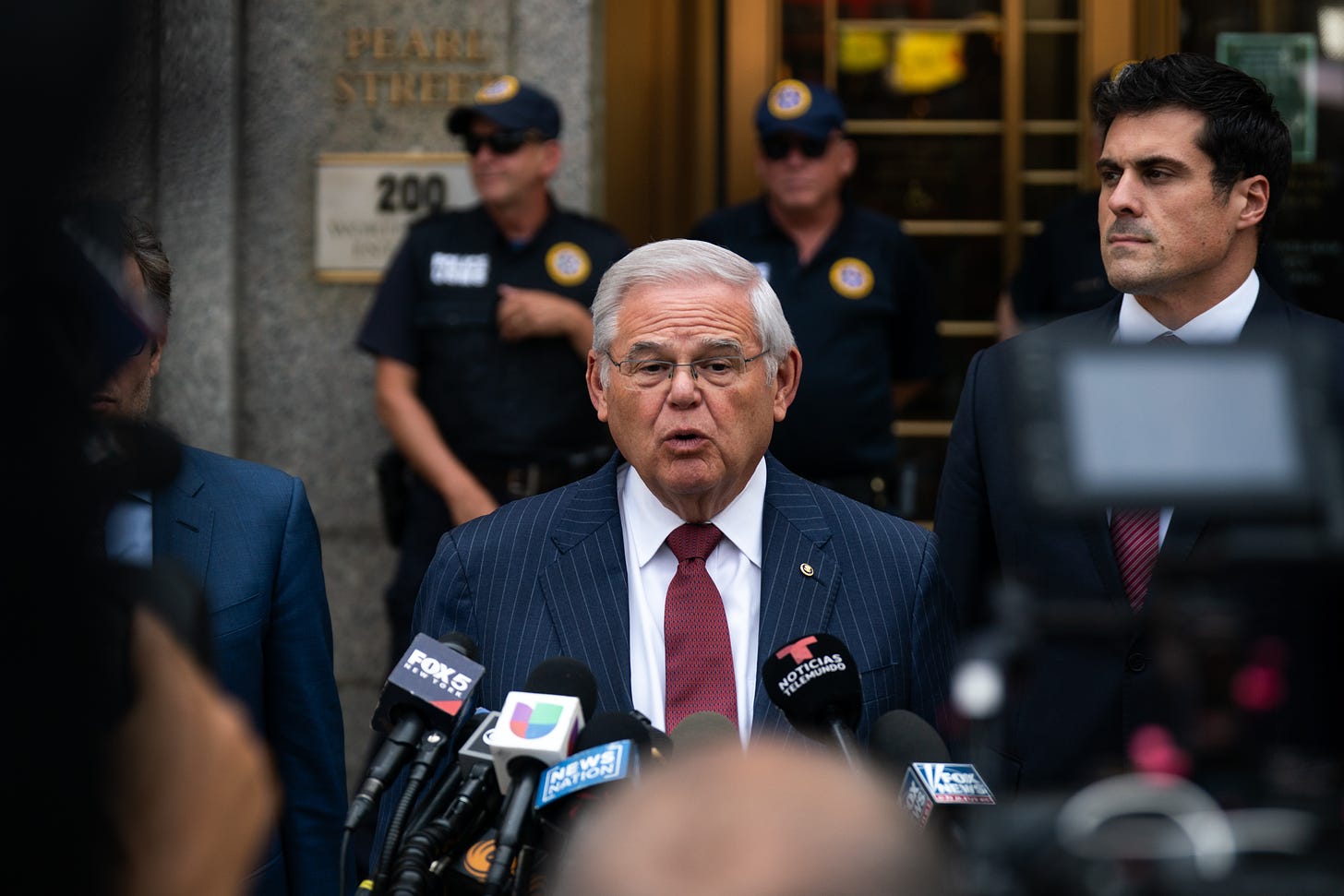The Menendez Conviction: A Stark Contrast to Justice Under a Future President Trump
Just look at the record of corruption and pardons from 2017 to 2021.

THE NEW YORK FEDERAL JURY that convicted New Jersey Senator Robert Menendez Tuesday on all sixteen felony counts relating to foreign and domestic pay-to-play corruption sent an unmistakable message: The rule of law still applies without fear or favor—at least for now in the U.S. Department of Justice. Even a powerful federal official who belongs to the Biden administration’s own party is not above the law.
Federal prosecutors charged Menendez with selling his influence to help Egypt acquire arms and to derail a federal prosecution. His conviction came on counts of extortion, bribery, wire fraud, obstruction of justice, and acting as a foreign agent. Among the proceeds that the indictment alleged that Menendez received for misconduct were cash, gold bars, and both a Mercedes convertible and a no-show job for his wife.
The message that accountability still exists for current high government officials who break the law is far from the only meaning the verdict carries for the political world. It also highlights an important contrast between the parties as the Republican convention proceeds to nominate Donald Trump as its candidate for president.
In the current administration, public corruption is prosecuted, not rewarded. Partisan allies (and even the president’s own son) committing crimes are indicted, not pardoned. But in any future Trump administration, we should expect the opposite. Just look at the record.
First, let’s talk about public corruption. From January 2017 to January 2021, the drop in prosecutions for officials dipping into the public till or selling their office and influence, as Menendez was just convicted of doing, is not surprising. Monetizing political power was not only the brand of the Trump administration; such exploitation of the public trust was apparently its mission.
As the ethics watchdog Citizens for Responsibility and Ethics in Washington (CREW) wrote days before Joe Biden’s inauguration in January 2021,
In the past four years special interest groups, foreign governments, and political groups together held more than 250 events at 14 Trump properties, likely resulting in tens of millions of dollars of revenue for the Trump Organization. President Trump’s properties offer these groups unbridled access to the nation’s most powerful policy makers.
This was all clear at the time. As David Leonhardt and Ian Prasad Philbrick put it in a deeply researched New York Times opinion article in October 2018, “They don’t even try very hard to hide it. President Trump, his family and more than a few of his appointees are using his presidency to enrich themselves.”
Leonhardt and Philbrick went on to describe how, “unlike previous presidents, Trump is directing money to his own business on his trips. In one three-month period last year [i.e., 2017], the Secret Service spent about $63,000 at Mar-a-Lago and more than $137,000 on golf carts at Trump’s Florida and New Jersey clubs.”
Trump’s cabinet members followed the leader. And as they say, the fish rots from the head. Leonhardt and Philbrick gave specifics:
Scott Pruitt, the former E.P.A. head, asked his staff members to contact Republican donors with the goal of helping his wife find a job. . . . Pruitt’s many scandals led to his resignation in July. Elaine Chao, the transportation secretary, used interviews with Chinese and Chinese-American media to raise her father’s profile.
Other examples abound. The interior secretary who left amid a hailstorm of allegations of illegal use of government resources. The FEMA director forced to repay the government after spending taxpayer dollars on his personal travel expenses. The officials who invested in companies they were regulating. Did any of the gang that couldn’t keep straight get prosecuted? If they did, my bad—I missed it.
Second, think back to Trump’s long track record of using his Justice Department and pardon power as tools of political muscle, favoring his friends and partisan allies with release from accountability to the law. Recall how Attorney General Bill Barr sought to overturn the guilty pleas, secured by Special Counsel Robert S. Mueller, of Michael Flynn, Trump’s first national security advisor, and how Trump pardoned Flynn on the eve of the last Thanksgiving of his administration.
Barr also appointed one-time Connecticut U.S. Attorney John Durham special prosecutor to try to undo the Mueller Report and get revenge on Democrats. Durham produced only two prosecutions, both tangential to the Trump-Russia investigation. In both cases, he faceplanted for lack of compelling evidence.
The instances of Trump relieving friends and family of criminal accountability were legion. He pardoned, in addition to Flynn, his convicted former campaign manager, Paul Manafort. He commuted the sentence of his longtime political ally, Roger Stone. He even pardoned his daughter Ivanka’s father-in-law, Charles Kushner, who had been convicted on multiple counts of tax evasion connected with a prostitution/revenge-porn scheme to retaliate against a federal witness against him—his brother-in-law!
Securing impunity for allies remains a consistent theme with Trump. During his current run for president, he has loudly proclaimed his intent to “free” people who have been convicted for crimes related to their participation in the violence of January 6th. He has even suggested he would consider pardoning the members of the Proud Boys convicted of seditious conspiracy.
There, too, the contrast with President Biden is stark. After his son Hunter was convicted for unlawful possession of a firearm as a person using or addicted to drugs, the president pledged to neither pardon nor commute any sentence Hunter receives. Indeed, the very fact that the attorney general appointed a special counsel to independently investigate and pursue charges against the president’s son would be unimaginable in a second Trump administration.
Equal justice before the law requires a president whose Justice Department holds criminal actors to account without fear or favor. Corruption and its deterrence are on the ballot.





